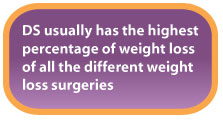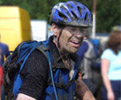The Duodenal Switch (also known as Bilio-Pancreatic Diversion with Duodenal Switch or the DS), is a form of weight loss surgery that combines two components. The first is a restrictive element - known as a partial sleeve gastrectomy. This involves removing a portion of the stomach, reducing the volume to approximately a third of its original size, thus restricting the amount the patient is able to consume. This can be extremely restrictive immediately post op. The stomach stretches over time (the amount of  time varies quite significantly) and in most cases patients are eventually able to resume eating average portion sizes.
time varies quite significantly) and in most cases patients are eventually able to resume eating average portion sizes.
The second part of the DS is a malabsorptive element which rearranges the small intestine by dividing it into separate paths. These paths are rejoined lower down the digestive tract. This bypass of part of the small intestine limits the time the body has to absorb food. It is here that most of the absorption of fat occurs in the body.
Both components may be performed in one procedure, or they may be performed in two separate parts. This is often dependent on the BMI and/or risk factors facing the patient. The surgeon may decide to do the sleeve gastrectomy first to enable the patient to lose weight and lower potential risks before performing the more complex malabsorptive element.
The amount the body will malabsorb is dependent on the length of the common channel. Most surgeons will shorten the common channel to between 75 -150 centimeters.
This surgery is often favoured in patients with higher BMIs, as the DS has the highest percentage of weight loss of all the different weight loss surgeries. The malabsorbtive element can also be helpful in maintaining weight loss with fewer occurrences of regain.
Advantages of the DS
- Rapid and large percentage of weight loss.
- Lower percentage of weight gain.
- Most DS patients are eventually able to eat normally.
- No dumping syndrome.
- Co-morbidities often improve, or even disappear completely.
- The DS has been known to 'cure' type 2 diabetes
Disadvantages of the DS
- The patient needs to be committed to taking vitamins as a large amount of essential nutrients are malabsorbed.
- The patient needs to be committed to eating large portions of protein (80-100g a day, double the average intake) as the body is only able to absorb approximately 50% of the protein it receives.
- Blood tests on a regular basis for life to ensure all vitamins and minerals are in the normal range.
- Annual Dexa scan to ensure bones remain healthy and there is no calcium deficiency
- If the above is not adhered to, the DS patient can become extremely ill and in some cases may lead to permanent damage or a fatality.
- DS patients absorb 100% of the sugar they eat and 80% of the carbohydrates.
- As a result of undigested fat, too much sugar and/or high carbohydrate intake, the patient can experience offensive wind and might suffer with diarrhoea. This is due to undigested fat and an imbalance in the bacteria in the intestines.
- The patient may overshoot - losing too much weight.
- Some patients may not lose as much as they need to and may require a revision.
Living with the DS
I had my DS in Belgium in September 2005. At the time I must have weighed in excess of 27 stone, but I was too heavy to be weighed. Other than developing pneumonia immediately post op (which had nothing to do with the surgery itself), I had an extremely uneventful recovery. My surgery was performed laparascopically and I was back at work within 6 weeks (would have been sooner had it not been for the pneumonia). Initially I was not able to eat much, but at about 6 months post op I noticed my stomach stretched, it seemed to stretch again at 9 months and then at 12 months. Today I am able to eat out comfortably and can manage a two (and sometimes three) course meal.
I was lucky as I never suffered with diarrhoea, except for the first few days post op. I generally go once a day, when I wake up, as I did pre-op, unless I seriously overdo the amount of carbohydrates and sugar I eat. I have also been lucky never to have suffered with bacterial overgrowth requiring a course of antibiotics. That said, I do suffer with awful smelling wind and toilet trips when I have too many carbs and I can get quite bloated. If I don't drink 2 litres of liquid a day I am prone to constipation, but I think this is due to all the iron I take. At about 4 months post op, I suffered with hair loss. This continued for a couple of months and was quite stressful at the time, but was never significant enough to be noticeable to anyone else.
I always ensure I take my vitamins, drink my water and eat at least 80-100g of protein daily. I have lost over 13 stones and would ideally like to lose another 3. I know I would be able to achieve this if I cut out all the carbohydrates and sugar I eat, but I am happy being able to eat whatever I want and as much as I want and still maintain my weight. I have a lot of excess skin that needs to be removed, which I am hoping to eventually have done, but at the moment I am able to lead a happy, healthy life doing all the things an average size person is able to do. I can do up a seat belt, fit in an aeroplane seat (with the tray down), take a bath, exercise, swim, ride a bike, ride a horse, walk for hours, shop in normal size clothing shops, all the things I was unable to do pre-op. All my co-morbidities have disappeared and I no longer suffer with high blood pressure and high cholesterol. I have far more energy and don't suffer with sore feet and joint pain.
Having the DS was definitely the best decision I could have made and has saved my life. My only regret is that I didn't do it years earlier.







